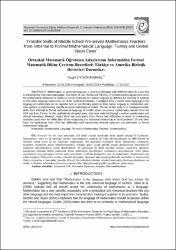| dc.contributor.author | Uygur-Kabael, Tangül | |
| dc.date.accessioned | 2019-10-19T21:02:54Z | |
| dc.date.available | 2019-10-19T21:02:54Z | |
| dc.date.issued | 2017 | |
| dc.identifier.issn | 1300-5340 | |
| dc.identifier.uri | http://www.trdizin.gov.tr/publication/paper/detail/TWpReE5ESTVPUT09 | |
| dc.identifier.uri | https://hdl.handle.net/11421/15293 | |
| dc.description.abstract | Evrensel bir dil olan matematik dili farklı uluslar tarafından farklı anadil desteği ile kullanılır. Matematiksel ifade ya da cümleler sembol kullanmaksızın anadilde de ifade edilebildiğinden, bu dilin formal ve informal olmak üzere iki tür kullanımı doğmaktadır. Bir anadilden matematik diline dönüştürme, cümlelerin anadilden matematik diline dönüştürülmesinin ötesinde genel olarak günlük yaşam durumlarının matematiksel modellere dönüştürülmesi olarak düşünülebilir. Bu çalışmada iki farklı ülkeden ortaokul matematik öğretmen adaylarının informal dilden matematik diline dönüştürme becerilerinin incelenmesi amaçlanmıştır. Nitel olarak desenlenmiş olan çalışmanın verileri yazılı soru formu ve klinik görüşmeler yolu ile toplanmıştır. Araştırmada elde edilen bulgular Türkiye'den katılan ortaokul matematik öğretmen adaylarının problemde nicelikleri ve fonksiyonel ilişkiyi oluşturma ve tanımada, Amerike Birleşik Devletlerinden katılan ortaokul matematik öğretmen adaylarının ise cümle ve ifadeleri informalden formal matematik diline dönüştürmede güçlük yaşadıklarını göstermiştir | en_US |
| dc.description.abstract | Mathematics, as universal language, is used by individuals with different native in a way that is influenced by their native languages. Two kinds of uses, formal and informal, of mathematical language arise since the mathematical statements or sentences can be expressed in a native language by defining the meaning of symbols in that native language without the use of the symbols themselves. Translation from a certain native language to the language of mathematics can be regarded both as transforming sentences from native language to mathematics and, more general, as transforming real-life events to mathematical models. The aim of this study is to investigate transfer skills from informal to formal mathematical language of middle school pre-service mathematics teachers from the USA and from Turkey. In this qualitatively designed study, data were obtained through a written questionnaire and clinical interviews. Research results show that participants from Turkey had difficulties in terms of constructing quantities apart from the difficulties of not recognizing the functional relationship in word problems. On the other hand, the participants from USA had difficulties with transferring informal sentences and statements to formal mathematical language | en_US |
| dc.language.iso | tur | en_US |
| dc.rights | info:eu-repo/semantics/openAccess | en_US |
| dc.subject | Eğitim | en_US |
| dc.subject | Eğitim Araştırmaları | en_US |
| dc.title | Ortaokul Matematik Öğretmen Adaylarının İnformalden Formal Matematik Diline Çevirme Becerileri: Türkiye ve Amerika Birleşik Devletleri Durumları | en_US |
| dc.title.alternative | Transfer Skills of Middle School Pre-service Mathematics Teachers from Informal to Formal Mathematical Language: Turkey and United States Cases | en_US |
| dc.type | article | en_US |
| dc.relation.journal | Hacettepe Üniversitesi Eğitim Fakültesi | en_US |
| dc.contributor.department | Anadolu Üniversitesi, Eğitim Fakültesi, Temel Eğitim Bölümü | en_US |
| dc.identifier.volume | 32 | en_US |
| dc.identifier.issue | 4 | en_US |
| dc.identifier.startpage | 1013 | en_US |
| dc.identifier.endpage | 1031 | en_US |
| dc.relation.publicationcategory | Makale - Ulusal Hakemli Dergi - Kurum Öğretim Elemanı | en_US] |


















